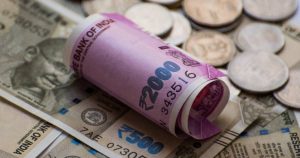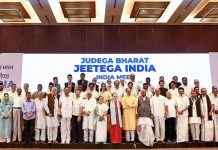 The landslide victory of Bhartiya Janata Party and its allies under the charismatic leadership Narendra Modi in the general elections of 2019 in India has raised concerns about the growing caste polarization and ideological extremes but in the same breath, it has raised the hope of revival of the Indian economy that has been battling with sluggish demand, low capital formation and freeze on the flow of credit.
The landslide victory of Bhartiya Janata Party and its allies under the charismatic leadership Narendra Modi in the general elections of 2019 in India has raised concerns about the growing caste polarization and ideological extremes but in the same breath, it has raised the hope of revival of the Indian economy that has been battling with sluggish demand, low capital formation and freeze on the flow of credit.
With 353 Lok Sabha seats in its basket, the NDA (National Democratic Alliance) is now saddled with higher expectations especially on the economic front.
The senior officials in the core ministries at the Government of India have reportedly indicated that the central government is ready with a blueprint to boost consumption demand and stimulate higher private investment by pruning the cost of capital.
Having suffered a mighty blow of demonetization and a hasty GST rollout, in the prevailing slowdown in demand during the last few years; the trade and industry is keen to see the incorporation of their demands in the revised policy framework of second tenure of NDA-II. The incumbent regime has bounced back with a stronger mandate than its last innings, so the speedy implementation of proposed reforms is expected by the corporate India.
The full budget for 2019-2020 is expected to include the schemes for the trade and industry proposed and promised in the election manifesto of BJP.
Praveen Khandelwal, National Secretary General of Confederation of All India Traders apprised Tehelka about the expectations of traders across India from the new government. He told that the first priority of the government should be to implement immediately the promises made in manifesto of BJP which include National Traders Welfare Board, National Policy for Retail Trade, Pension to traders above age of 60 years, Accidental Insurance of Rs 10 lakh for GST registered traders, Merchant Credit Card on pattern of Kisan Credit Card.
He added, “Besides these promises the major focus should be on simplification of GST, concessional rate of Income Tax for traders, Declaration of E-Commerce Policy which should be applicable on domestic players as well, abolition of archaic Acts governing trade , instead of several licenses only one license for conducting business activities, formation of a Ministry of Internal Trade, promotion of digital payments and incentives to be given on usage of digital payments, subsidy to traders for computerization of existing business format, Infrastructural developments of commercial markets in the country and setting up of Special Trade Zones . We however assure our full support to the Government in overall change of trade in India but Government should draw policies and steps with our consultation. We are for modernization of Indian trade and adoption of fair and better trade practices.We see trade in a good position and it is the right time when Government should keep domestic trade on its priority and if due steps are taken we are competent to stand in global competition. Policies should be made to encourage domestic small manufacturing and trade entities so that Indian exporters could make globally competitive export items to fetch foreign exchange for the country. We welcome foreign investments but it should be envisaged to strengthen our trade and manufacturing sector. At the same time the government has to guard domestic trade and small manufacturing against foreign onslaughts. If hand-holding is done properly, India stands bright chances in global scenario. We also expect the government to take steps to restrict imports from China as it has damaged a lot to our trade and small manufacturing. Not casual but an aggressive approach is needed to safeguard trade in the country which will help in revenue generation to the government as well”.
The garment exporters from India are also sanguine over the spectacular mandate to NDA and are awaiting long awaited reforms on export front. A. Shaktivel, President of Tirupur Exporters Association told that Indian garment exports have been facing tough competition from countries like Bangladesh, Vietnam and Cambodia.The annual export earnings from garments stand at approximately $17 billion in India. Bangladesh is ranked higher with $37 billion of annual garment exports. Vietnam with $27 billion also ahead of us and Cambodia earns close to $11 billion from exports of readymade garments. Considering the potential of Indian garment industry and availability of raw material and manpower in India, our government should support this industry to compete in global arena.
He added that Duty Free Agreement with Europe and United Kingdom can help spur the industry. Comprehensive Economic Partnership Agreement with Australia and Canada is also one of the demands of the industry. The scope of interest subvention of 3 per cent should also be expanded. He stressed that most of the raw material used by the garment units is procured from domestic market. Infusion of energy in garment industry by fresh policy initiative will have a trickledown effect on the agriculture sector that is in distress. Cotton is the major input for garment sector and stability in demand of cotton will help in better remuneration to the farmers. As farm distress is also on government agenda, we hope to see policies conducive for the growth of garment exports.
A well-oiled SME (small and medium sector) is a pre-requisite for the overall industrial development of an economy. The SME sector has undergone an ordeal post demonetization and GST (Goods and Service Tax) rollout. Cost-cuttings, lay-offs, repayment of debt and stringent credit norms by banking sector have pushed the SME sector into shambles.
The small entrepreneurs on the condition of anonymity told that SMEs have been denied of subsidies during the last two years earmarked for them. These were not rolled back but at the same time unavailable. Schemes like Lean Manufacturing (80 per cent cost of implementing lean tools and techniques are borne by Ministry of Micro, Small and medium Enterprises, while remaining 20 per cent is funded by the unit), CLCSS (Credit Linked Capital Subsidy Scheme for Technology Up gradation, Technology and Quality Up gradation Support to MSMEs and MSME Scheme for International Cooperation, according to the entrepreneurs were dilly dallied. Hence, the schemes though alive on papers turned redundant for the eligible entities.
The NDA Government announced to revise the definition of MSME when it assumed power in 2014. An MSME in India is defined as an enterprise with an investment of Rs 5 cr in plant and machinery. This definition was last revised in 2006. According to MSMEs, the investment limit should be scaled up factoring in the inflation. In 2018, Union Cabinet approved to redefine MSME unit from the benchmark of turnover instead of plant and machinery. But it was not implemented.
According to Rajiv Chawla, a senior member of Faridabad Industry Association told that expectations of MSMEs are extremely high. The disruptions in the form of demonetization and GST severely undermined the mall businesses. They now expect the government:
(i) To revise the definition of MSMEs either on the basis of turnover or plant and machinery.
(ii) Revive all subsidy schemes.
(iii) Facilitation of bank credit flow to MSME sector
He added that MSME clusters hope for a budget that understands the needs of small and medium outfits. The MSMEs are indispensable for the big industries. A sluggish MSME sector is a bad signal for the economy struggling to achieve its growth targets.
P K Jain, former President of PHD Chamber of Commerce and Industry told that availability of finance to MSMEs has been curtailed due to huge NPAs in banking sector. Industrial activity cannot pick up until easy and long-term finance is available for production. To reap the benefits of revival in demand, timely availability of capital is a must. During the last three years, MSMEs have made minuscule capital investments. “We expect the government to lay thrust on MSME sector as the progress of MSMEs will have a cascading effect on the economy”, he added.
The ginning mills in Haryana contend for a level playing field. According to Sushil Mittal, President of Haryana Ginning Mills Association, “There should be uniformity in taxes. If GST is implemented in the entire country as one tax then the discrimination in other forms is not healthy for the business. We hope our representations to the government will now bear fruit and relaxation in market fee on cotton in Haryana will be announced”.
Arun Jimmy, Ernakulam based entrepreneur and importer told that they were awaiting the government’s decision on their shipment stuck at the Kochi Port post the revision of import duty by 200 percent on imports from Pakistan. “Our containers shipped out of Karachi Port onto the vessel before the notification of hike in duty by 200 per cent on16 February 2019. We have no intention to trade with Pakistan but hope the government would consider our petition on relaxing the revised duty”, he said.
The recent trends like Fall in the car sales of Maruti-Suzuki by 18.7 per cent, crisis in NBFCs (Non-Bank Finance Companies), slowdown in FMCG companies, Jet Airways crisis and huge inventories with construction companies are indicative of an impending slowdown. Aggressive measures to pump in energy in the economy are what every business entity, whether small or big is aspiring. Will the new NDA Government be able to bear a heavy load of expectations?
letters@tehelka.com













